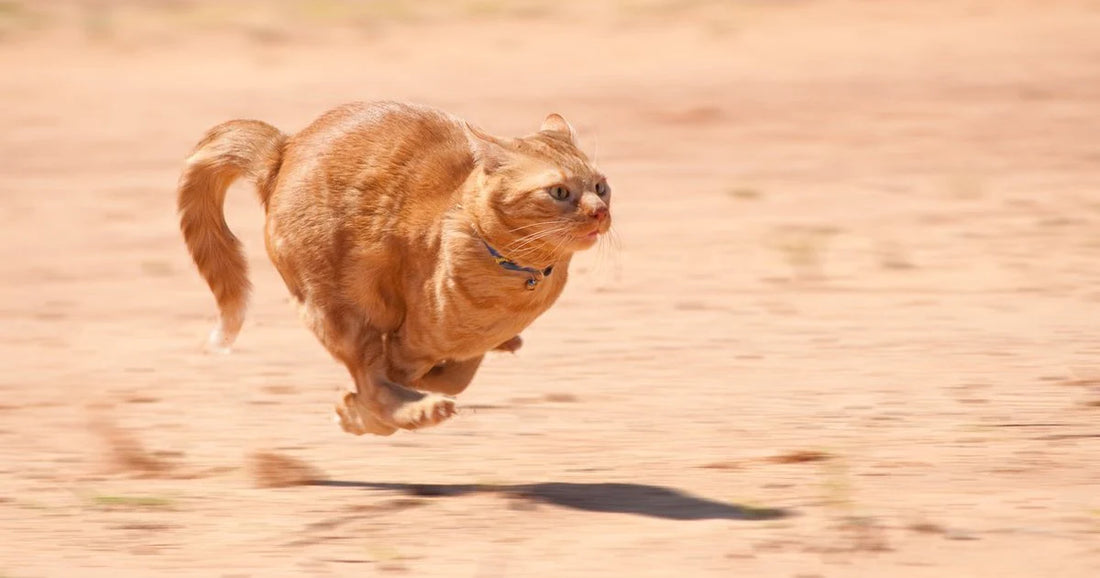
The Curious Case of Post-Poop Zoomies in Cats: What’s Behind the Frenzied Dashes?
If you’re a cat owner, you’ve probably witnessed this bizarre but hilarious phenomenon: your cat visits the litter box, finishes its business, and then—out of nowhere—zooms around the house like it's just been shot out of a cannon. The post-poop zoomies are a mystery that many cat owners have puzzled over for years, and while science hasn’t definitively pinned down the exact cause, there are a few well-supported theories that can shed light on this quirky behavior.
In this blog post, we’ll explore why your feline friend transforms into a furry blur after using the bathroom, whether it’s normal, and how you can make sure they’re happy and healthy while indulging in this entertaining habit.
What Are Post-Poop Zoomies?
Post-poop zoomies refer to that sudden burst of energy cats seem to have immediately after using the litter box. The term "zoomies" itself is informal but widely recognized among pet owners, describing the fast, frenetic running around that cats and dogs alike can exhibit. It’s also called "FRAP," or Frenetic Random Activity Periods. For cats, this behavior seems especially common after defecating, leaving many owners to wonder what exactly is going on in their feline's minds during these episodes.
Common Reasons for Post-Poop Zoomies
While we may never truly know what's going through a cat's head in the moments before the zoomies, there are several theories to explain this odd behavior. Below are some of the most widely accepted explanations:
1. A Sudden Sense of Relief
One of the simplest explanations for post-poop zoomies is that your cat simply feels relieved after doing their business. The physical sensation of evacuating their bowels could bring on a feeling of lightness or comfort, prompting an energetic burst. It’s similar to how humans sometimes feel relief after a long-needed bathroom break, except instead of walking back to their seat at the table, cats express it by sprinting across the room!
For cats, whose bodies are designed to be agile and energetic, this relief can translate into an instinctive "get up and go" moment.
2. It’s a Throwback to Their Wild Instincts
One interesting theory suggests that the post-poop zoomies could be rooted in your cat’s wild ancestry. Cats in the wild would often need to be cautious about predators after defecating. Their poop could leave a scent that might attract larger predators, so getting away from the spot quickly might have been a survival instinct.
Although your house cat no longer has to worry about lions, wolves, or other threats, some feline behaviors are deeply ingrained in their DNA. The post-poop zoomies might be a remnant of that instinct to "flee the scene" after leaving a scent behind.
3. Stimulation of the Vagus Nerve
The vagus nerve is a long cranial nerve that runs from the brain all the way down to several key organs, including the intestines. For some cats, defecating may stimulate this nerve, triggering an adrenaline rush or endorphin release. This would explain why they seem to be extra energized after using the bathroom.
In both cats and humans, stimulation of the vagus nerve can sometimes create a feeling of light-headedness or euphoria, leading to excitement or even giddiness. For a cat, this might translate into a sprint around the house or a play session.
4. Cleaning Up After Themselves
Another theory ties into feline fastidiousness. Cats are well known for their love of cleanliness, and some speculate that the zoomies after defecating could be their way of "shaking off" any residual discomfort or mess. While this explanation isn't as widely accepted, it’s worth noting that cats take great pride in their cleanliness, and a sudden burst of activity might be their way of tidying up any last bits of discomfort after a bathroom visit.
5. Sheer Joy and Excitement
Sometimes, the simplest answer is the right one: your cat is just happy! Cats can be playful, and their zoomies could be their way of expressing joy. After the "chore" of going to the bathroom, your cat may feel lighter and ready to burst into action. It could be their equivalent of doing a celebratory dance after completing a task.
When you consider how unpredictable and whimsical cats can be, it’s not too far-fetched to think that post-poop zoomies are just a random moment of feline excitement!
Is It Normal for Cats to Have Post-Poop Zoomies?
Yes, post-poop zoomies are completely normal and not a cause for concern. In fact, this behavior is more common than you might think. Just like other oddball habits—such as knocking things off counters or hiding in tiny boxes—zoomies are simply part of the quirky, joyful nature of cats.
That said, if your cat suddenly develops new or extreme zooming behavior and also seems to be uncomfortable, in pain, or avoiding the litter box, you might want to consult a veterinarian. These could be signs of a digestive or urinary issue, such as constipation, diarrhea, or an infection. But in most cases, post-poop zoomies are harmless and simply part of your cat's vibrant personality.
Tips to Support Your Zooming Cat
While the zoomies can be fun to watch, it’s important to ensure your home is a safe place for your cat to engage in this kind of play. Here are some tips for making sure their zoom sessions are safe and healthy:
-
Provide plenty of space: Cats love to stretch their legs during a zoomie session. If possible, create an open area in your home where your cat can run without obstacles, such as breakable items, sharp corners, or slippery floors.
-
Ensure a clean litter box: A clean litter box can encourage regular bathroom habits, which may reduce any stress or discomfort that could cause post-poop zoomies.
-
Play with your cat: Sometimes zoomies are an expression of pent-up energy. Regular interactive play sessions can help your cat burn off that energy in a fun and productive way.
-
Offer engaging toys: Toys that stimulate your cat both mentally and physically—like laser pointers, feathers on a string, or puzzle feeders—can help satisfy their need for stimulation.
-
Monitor for signs of discomfort: If your cat seems to be zooming due to discomfort, particularly if they’re rushing to and from the litter box, take note. A sudden change in bathroom behavior could be a sign of a medical issue, so consulting your vet is a good idea in such cases.
Conclusion
Cats are wonderful, mysterious creatures with an array of quirky behaviors that continue to fascinate and amuse their owners. Post-poop zoomies are just one more reminder of the playful, unpredictable nature of felines. While the exact reasons for this behavior may vary from cat to cat, the bottom line is that zoomies are usually harmless and a normal part of cat life. Whether it's relief, instinct, or simply joy, watching your cat race around the house post-poop is sure to bring a smile to your face—and probably theirs too!
So the next time you see your kitty dashing around like they’re on a mission, just know that it's all part of their fascinating and lovable feline charm.
